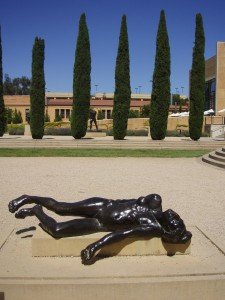In 2006 I journeyed to Stanford University as part of a fellowship to study the relationship between leadership and power. I say ‘journeyed’ because that is what the experience felt like – by the end of it I felt like a weary traveller who had battled many monsters and looked into the abyss. However, like many hero’s journeys, I came back with treasure, namely, what are the behaviours that can be learned that will help us become more powerful? And the central truth from my travels was that we become more powerful by making others more powerful. So how could I do that, in a way that enriches the greater good?
Over the past seven years I have made it my mission to study the interrelated areas of charisma, power and integrity, and how together, they can can transform talented, overly-modest individuals who are unable to get leverage in their own lives, to a confident contributed and connected people.
“I had no idea that being your authentic self could make me as rich as I have become. If I had, I would have done it a lot sooner.”
– Oprah Winfrey
People sometimes believe that charisma is something you are either born with, or you are not. And yes, some people do have seem to have bucket-loads of it. What is it that people with charisma do and say that inspires and motivates others?
Max Weber talked directly about charisma as being a form of authority as ‘power legitimized on the basis of a leader’s exceptional personal qualities or the demonstration of extraordinary insight and accomplishment, which inspire loyalty and obedience from followers’.
In today’s leadership climate, the need for loyalty and blind obedience from followers has been replaced by the need for problem solving and creativity, set within the context wider organisational expectations, Weber also posed that charisma was a mysterious quality which could not be learned. I challenge this. When the behaviours that demonstrate charismatic leadership are unpacked and identified, then charisma become available to everyone as part of human connection.
So what is charisma? Charisma is a specific set of verbal and non-verbal behaviours which together, create a sense of personal magnetism between one individual towards others. What if these behaviours can be learned?
Charisma is an essential skills for today’s leaders. Charisma helps leaders set a compelling vision and motivate their people to achieve goals. It sits at the intersection between leadership, power and integrity, and is essentially the sweet spot when these three areas are working in harmony. Leadership is many things, and one thing researchers seem to agree on is that one of the key leadership behaviours is to set the vision and align the organisation with that vision.
Leaders with integrity are those who help others be at their best. Charismatic leadership is about ethical leadership, acting with integrity – doing what you will say you will do when you will do it and bringing the humanity and sometimes even vulnerability to your leadership practice.
In conclusion, a polished and charismatic leader is one who has high awareness of what is under their control – they know how to turn up the volume on certain behaviours and turn down the dial on their energy leakages. This knowledge is something you can draw on so that you are always at your best, even on your ‘off days’.
A question to ponder: How do you help people feel ‘spot lit’ when they are around you, so that they can, in the words of John Quincy Adams –
‘Dream more, do more and become more?’

